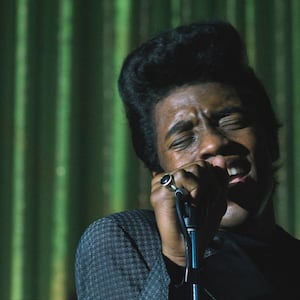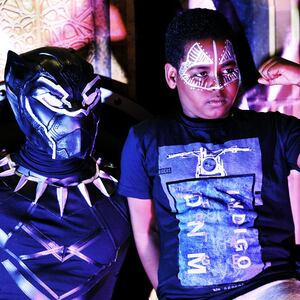There is a story that Andy Serkis loved to tell during the press tour for Black Panther. In March of 2017, over 700 crew members—and 150 vehicles—had assembled in Busan, South Korea, to shoot the film’s big chase sequence, with T’Challa/Black Panther (Chadwick Boseman) in hot pursuit of Ulysses Klaue (Serkis), an arms dealer smuggling precious vibranium. It ends with Black Panther snaring Klaue, and subduing him with a swift knee to the chest.
“It was a night shoot and the very, very first take he kneed me so hard in the chest, ’cause he couldn’t really see with his mask on,” Serkis recalled. “I felt like he had broken my ribs in that very first take.”
By Serkis’ count, they ended up shooting the scene at least 30 times, with Boseman, who had trained extensively in Angolan capoeira, Dambe boxing, Zulu stick fighting, karate, kung-fu and jiu-jitsu for the role, giving it his all each time.
Even under normal circumstances, the task was extraordinary. But on Friday night, we learned that Boseman, 43, accomplished it while battling colon cancer.
“It is with immeasurable grief that we confirm the passing of Chadwick Boseman,” the statement read. “Chadwick was diagnosed with stage III colon cancer in 2016, and battled with it these last four years as it progressed to stage IV. A true fighter, Chadwick persevered through it all, and brought you many of the films you have come to love so much. From Marshall to Da 5 Bloods, August Wilson’s Ma Rainey’s Black Bottom and several more, all were filmed during and between countless surgeries and chemotherapy.”
To project such incredible power—and strength—when you are so depleted is almost unfathomable. But Boseman did it. He became a global screen icon, greeting audiences around the world, while privately fighting for his life. And make no mistake: he was every bit the movie star, possessed of an effortless charm and charisma.
Boseman did not come from considerable means. He was born in Anderson, South Carolina, to a nurse and textile worker. Basketball was his first love, and he was getting recruited to play college ball, until a tragedy at his school saw him change course. His teammate was shot and killed; Boseman responded by penning a play in the boy’s honor, Crossroads, and staging it at the school.
“I just had a feeling that this was something that was calling me,” he told Rolling Stone. “Suddenly, playing basketball wasn't as important.”
He attended Howard University to study directing, and took acting classes on the side. When he was accepted to the British American Drama Academy’s summer program at Oxford to study theater, he couldn’t afford it, so one of his teachers, Phylicia Rashad (of The Cosby Show fame), solicited a donation from an unnamed celebrity for him to go. There, he honed his craft, and upon graduating, moved to Bed-Stuy, Brooklyn, where he immersed himself in the local theater scene; to make money, he taught kids acting at the Schomburg Center in Harlem.
Bit parts on TV series like Law & Order and CSI: NY followed, and in 2008, he moved out to L.A. to break into film. After a couple of appearances on the shows Lincoln Heights and Persons Unknown, he got his big break, landing the role of baseball legend Jackie Robinson in the biopic 42. While the film was Disney fluff, you could not take your eyes off Boseman, who expertly captured Robinson’s inner battle of projecting grace in the face of endless hate.
For this writer’s money, Boseman’s most electrifying turn came in Get On Up, the 2014 James Brown biopic. Though bearing little physical resemblance to the “Godfather of Soul,” he managed—through hundreds of hours of vocal and dance training—to embody his essence. I had the honor of profiling Boseman for the film, and in our brief time together, found him to be tender, quick-witted (you have to see his hilarious Karen with the potato salad SNL sketch), and deeply introspective.
“He’s a hard worker, and an artist,” Oscar-winner Octavia Spencer, who played Brown’s aunt, told me of Boseman. “The success of the film begins and ends with Chadwick’s believability as James Brown, and he really pulls it off.”
While Get On Up earned him Oscar buzz, Black Panther made him a superstar—and, as the first Black superhero headliner in the Marvel Cinematic Universe, an inspiration to millions of Black boys and girls.
“It was the honor of his career to bring King T’Challa to life in Black Panther,” the aforementioned statement read. “He died in his home, with his wife and family by his side. The family thanks you for your love and prayers, and asks that you continue to respect their privacy during this difficult time.”
Boseman’s final film is Ma Rainey’s Black Bottom, an adaptation of the August Wilson play of the same name that will be released later this year by Netflix. And it is produced by Denzel Washington—the man who, Boseman would discover years later, paid for his studies in Oxford.



